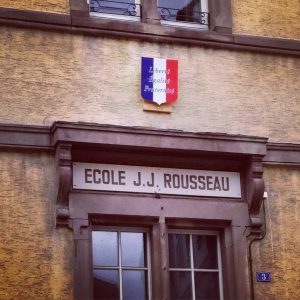Now that we are starting our courses it is good to reflect on the reasons why we choose an active teaching approach instead of the transmission-based methodology.
Traditionally, the transmission-based method has been dominant in education. Nowadays, it seems totally extemporaneous and counterproductive.
On my first blogpost I wrote that it is useless to base fomal education in the transmissive model due to the vast amounts of information provided by the advent of the Information and Knowledge Society. I got the feeling that to give or to receive transmissive-based lectures at the university was not working anymore and that it was even ridiculous. As a lecturer I use this system from time to time when it is real necessary: if I have to give more “processed” information, if I have to introduce a topic to situate learners, to save time, because what is to be learned is hard to understand, etcetera.
The next video is just an example of the consequences of certain lectures that are going on in the world:
The ways of student Bliss can be arguable and not suitable but his claims are crystal clear. There is a crazy scenario created by the unbalanced transition between the old world and the new world. The former is based on examinations in formal education terms: to dump what has been memorize just before an absolute oblivion. Is this what we re looking for as educators? Is this the ends of education? I believe not. Personally, I prefer to work on a few (important) things in a situated and significant way, specially from an active perspective.
The “transmission of information’s torture” often means a lack of pedagogical savoir faire and a few knowledge of what is to be taught. And this is felt by the students. It is an information that has been insufficiently learnt by the emitter that transmits information in a plain, unconnected and superficial. This leads to boredom. If a former victim of mine of “trasmission of information’s torture” is reading this, my sincere apologies. It was not sadisme; I didn’t know what I was doing.
According to the mismatches between the old world’s and the new world’s teaching methods, two years ago Dr. Miquel Àngel Prats professor of Universitat Ramon Llull, wrote a tweet about “Petite Poucette” (2012), a book by the French philosopher and Stanford professor Michel Serres. It was a great finding (it is a proof that networks are not always confusing us. It is just a matter of building a good PLE :-)). Well, the book describes the mismatch between the old world (modernity in the Enlightenment, the monolitic, etcetera) and the present world (postmodernity, liquidity, hyperconnectivity, …). It elicits the rigidity of certain institutions of society and culture and where education is not an exception. And it is quite funny that it is written by an octogenary man.
Serres says in a compact style: With the written form, Greeks invented paideia; after the press was created, pedagogy treaties started to wander around. Today? I repeat, ¿what should we transmit? knowledge? But how if it is already available and objectivated across networks. Transmit it to everyone in the world? From now on, knowledge is accessible to everybody. How can we transmit it? It is done already.

Knowledge is already “transmitted and distributed”. Therefore we don’t have to transmit it. We can also access it from the little smart device we carry in our pockets, wherever and whenever we please. This does not mean that school of formal education have lost its meaning because everything is taught or learned. That would be false. There is a lot to do, maybe more than ever! and a big range of ways to promote learning rather than knowledge transmission.
With the objective of learning certain concepts, processes, competences, skills, attitudes and values we must create activities that make our students get in touch with knowledge; that it connects with what we already know. That we, educators and students, make it ours. This is why active education and intersubjectivity is so important. Thus, transmission for transmission’s sake -and it is something that goes much further than death by powerpoint, which is necessary but just aesthetic-must cease.
It is important to promote inquiry, debate, collaboration, information management, work with information streams, and to implement information digital literacy skills (the learning to learn concept, criticized by many outside and inside the educational sectors). With this complex scenario it is fundamental to make space to engagement and creativity.
We are talking about how to organise teaching and learning. Without this change there are no skills nor competences and even less learning. The idea of “sage on the stage” to “a guide on the side” written by Alison King had total sense in 1993. Today, it is totally necessary.
Background music: “Baba O’Riley”, The Who (The Kids Are Alright, 1971).
